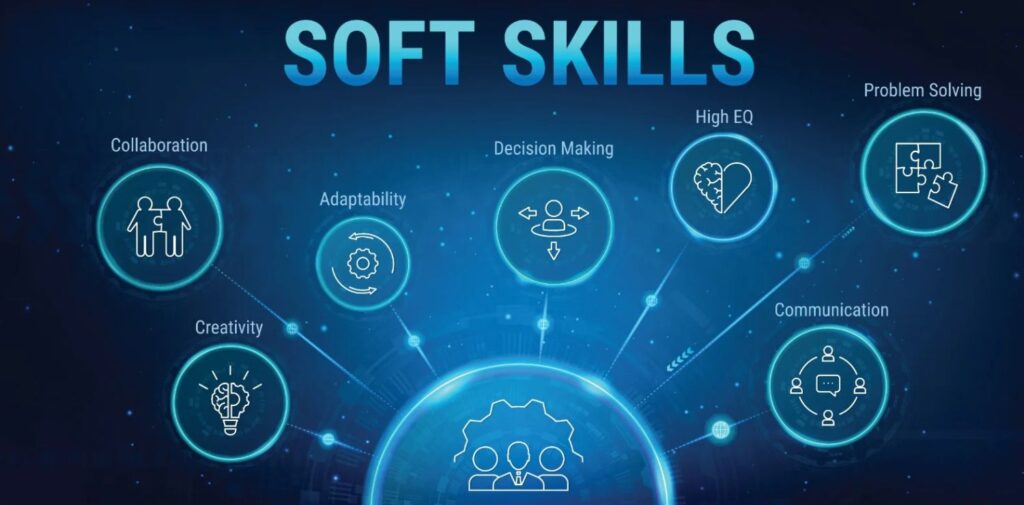As the world rapidly evolves, so does the job market. The future of work is expected to look vastly different from what we are accustomed to today, driven by emerging technologies, globalization, and shifts in workforce dynamics. As automation and artificial intelligence (AI) continue to reshape industries, certain skills are becoming more valuable, while others are losing relevance. So, what skills will be crucial to thrive in the Future Job Market?
The Changing Job Landscape
The Fourth Industrial Revolution is already transforming how we live, work, and interact. Automation, machine learning, and AI are leading to the disappearance of some traditional jobs while simultaneously creating new opportunities. According to a World Economic Forum report, nearly 85 million jobs may be displaced by 2025, while 97 million new roles may emerge, many of which will center around digital technology and human creativity.
To stay competitive in this rapidly changing environment, professionals must be aware of the emerging trends and the skills required to succeed.

Key Trends Shaping the Future Job Market
Automation and Artificial Intelligence: The integration of AI and automation into various industries is set to disrupt jobs that involve repetitive tasks. While machines can take over mundane activities, this shift is also creating a demand for professionals who can manage and work alongside these systems. Jobs in AI development, robotics, and automation will grow, while roles that require emotional intelligence and critical thinking will become indispensable.
The Gig Economy and Remote Work: The traditional nine-to-five job structure is giving way to more flexible and freelance-oriented work models. Platforms like Fiverr, Upwork, and Freelancer are increasing opportunities for individuals to work on a project-by-project basis, often from anywhere in the world. This flexibility is shaping how organizations hire, with a growing demand for independent contractors, consultants, and freelancers. In tandem, remote work is becoming the norm, as companies increasingly adopt virtual workplaces.
Sustainability and Green Jobs: With climate change and environmental sustainability becoming central global concerns, jobs in green technology, renewable energy, and environmental management are expanding. The transition toward sustainability will open up new roles focused on reducing environmental impact, from engineers working on eco-friendly innovations to consultants helping companies achieve net-zero carbon footprints.
Digital Transformation Across Industries: Almost every industry is undergoing digital transformation, increasing the demand for tech-savvy employees. Digital literacy is no longer just an advantage; it’s a necessity. From healthcare to manufacturing to finance, the ability to adapt to and implement digital technologies is becoming a cornerstone of future job success.
Skills That Will Be in Demand
Digital Literacy
As industries become more reliant on technology, digital literacy will be essential. Employees need to understand how to use digital tools, navigate software platforms, and communicate effectively online. The ability to manage cloud-based applications, use productivity software, and work with digital communication tools will be fundamental across industries. Even roles that don’t specifically fall under the “tech” umbrella will require a strong grasp of digital basics.

How to Acquire Digital Literacy:
- Enroll in online courses to learn how to use essential digital tools such as Microsoft Office, Google Workspace, or project management software like Asana or Trello.
- Stay updated on social media trends and tools, as they are increasingly important in professional communication and marketing.
Coding and Software Development
Coding has shifted from being a niche skill to a core competency in various sectors. Jobs that require coding expertise are no longer limited to traditional tech roles. Whether it’s data analysis, web development, or automation, understanding how to write and read code will help you stand out in the job market. Additionally, software development is projected to be one of the fastest-growing fields in the coming years, especially with the rise of cloud computing, app development, and the internet of Things (IoT).
How to Acquire Coding Skills:
- Start with basic programming languages such as Python, JavaScript, or HTML/CSS, which are widely used and relatively easy for beginners to learn.
- Take advantage of free or low-cost resources, such as Codecademy, Coursera, or freeCodeCamp.
- Participate in coding challenges and hackathons to sharpen your skills.
Data Analysis and Interpretation
Data is considered the new gold in today’s business world, and companies across all sectors are leveraging data to make informed decisions. Data analysts who can collect, clean, analyze, and interpret data are highly sought after. However, it’s not just about crunching numbers; the ability to translate data into actionable insights will be critical for decision-making roles.

How to Develop Data Analysis Skills:
- Learn how to use data analysis software such as Excel, SQL, and Python.
- Familiarize yourself with data visualization tools like Tableau or Power BI to communicate insights effectively.
- Take online courses focused on statistics, machine learning, and data science.
Artificial Intelligence and Machine Learning
As AI continues to automate tasks, professionals with skills in machine learning and AI development will be in high demand. From chatbots to autonomous vehicles, AI’s reach is expanding, creating a need for individuals who can develop, manage, and improve these technologies. Whether you’re in healthcare, finance, or retail, a basic understanding of how AI impacts your field will give you a competitive edge.
How to Get Started with AI and Machine Learning:
- Take introductory courses on AI and machine learning through platforms like Udemy or edX.
- Experiment with machine learning projects using Python and open-source frameworks like TensorFlow or PyTorch.
- Keep up with AI research and news to stay informed about the latest trends.
Soft Skills: Emotional Intelligence, Creativity, and Communication
While technical skills are important, soft skills remain invaluable in the future job market. Emotional intelligence, creativity, communication, and adaptability are skills that machines can’t replicate, making them critical to personal and professional success. Whether you’re managing a team, negotiating deals, or delivering a presentation, soft skills help to create a productive and collaborative environment.

How to Develop Soft Skills:
- Practice active listening and empathy in daily interactions to enhance emotional intelligence.
- Engage in creative activities like brainstorming sessions or artistic pursuits to foster innovation.
- Join communication or public speaking courses, such as Toastmasters, to improve verbal and written communication skills.
Adaptability and Lifelong Learning
The future job market will require professionals who are agile and able to pivot as industries evolve. Adaptability is more than just being flexible; it’s about having the mindset of continuous learning. New technologies, processes, and methodologies will emerge, and those who can quickly learn and apply these new tools will stay ahead of the curve.

How to Cultivate a Lifelong Learning Mindset:
- Set aside time for regular skill development through online courses, webinars, and reading.
- Engage in cross-functional projects at work to expose yourself to new tasks and teams.
- Stay informed about industry trends and attend conferences or workshops to expand your knowledge base.
Final Thoughts: Preparing for the Future of Work
The future job market is one of both challenge and opportunity. As industries transform under the weight of new technologies, the demand for both technical expertise and human-centric soft skills will continue to grow. Professionals must invest in acquiring digital literacy, coding, data analysis, and AI skills while also honing emotional intelligence, communication, and creativity.
Start by assessing where your strengths lie and identify areas for growth. Make learning an ongoing priority, leverage online resources, and seek out practical opportunities to apply your skills. By staying ahead of these trends, you’ll not only remain competitive in the job market but also position yourself to take full advantage of the opportunities in the new world of work.
The future belongs to those who are ready to embrace change and continually evolve their skill sets. Are you prepared?




